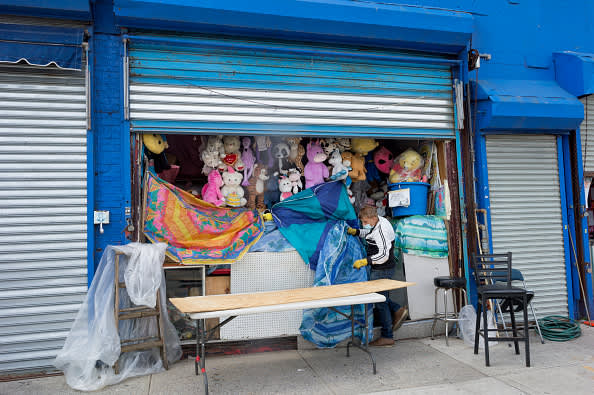The normally busy boardwalk at Coney Island in Brooklyn, New York, was still largely shuttered on May 24.
Andrew Lichtenstein/Corbis via Getty Images
The $600 enhancement to weekly unemployment checks is ending at the end of July.
While Democrats want to extend the extra pay into next year, Republicans appear resolute in blocking an extension.
But lawmakers on both sides of the political spectrum are floating other ideas, like tying aid amounts to the unemployment rate or paying a “bonus” to those who find a job.
Controversy over $600 benefits
Right-leaning lawmakers view the extra pay as a disincentive to return to work. Senate Majority Leader Mitch McConnell, R-Ky., recently said any additional financial-relief legislation wouldn’t extend the benefit.
But Democrats view the $600 payments as a lifeline for many Americans. The Democrat-led House passed a bill last month that would extend the benefit into 2021.
Given the discord, an extension of the current $600-a-week policy is unlikely, labor experts said.
Yet some sort of emergency benefit will probably take its place, they said, given unemployment is likely to remain high for the foreseeable future and finding a job will prove difficult.
The Congressional Budget Office projects a U.S. unemployment rate of 11.7% in the fourth quarter this year — which, while lower than April’s 14.7% unemployment rate, is still higher than any point since the Great Depression.
“I seriously doubt everything will be cut off,” said Michele Evermore, a senior policy analyst at the National Employment Law Project.
Automatic triggers
One policy approach would tie the amount and duration of unemployment aid to economic conditions.
One Democratic proposal, the Worker Relief and Security Act, offers an example.
The framework reduces aid as the public health crisis recedes and state unemployment rates improve.
Out-of-work individuals would continue receiving $600 a week during a national or state emergency tied to Covid-19.
I seriously doubt everything will be cut off.
Michele Evermore
senior policy analyst at the National Employment Law Project
The weekly allotment would gradually fall upon conclusion of the official health emergency.
For example, jobless workers would get an extra $450 a week in states with an unemployment rate above 7.5%. They would get that assistance for 13 weeks. After that , workers would get $300 a week if the unemployment situation didn’t change.
States with an unemployment rate below 7.5% would pay people $350 a week for 13 weeks, then $200 a week until the rate fell below 5.5%.
The proposal was authored by Rep. Don Beyer, D-Va.; Sen. Jack Reed, D-R.I.; and Sen. Michael Bennet, D-Co.
Employment bonus
Right-leaning lawmakers are using the idea of an employment “bonus” to encourage Americans to find a new job.
A proposal from Sen. Rob Portman, R-Ohio, would pay people who return to work an extra $450 a week.
The wage subsidy aims to eliminate any financial incentive workers may currently see in collecting unemployment benefits.
The bonus would end July 31, however — the same date on which the current $600-a-week benefit is scheduled to end.
Another idea Republicans are discussing would pay benefits in a lump sum of money in lieu of weekly checks, according to Ernie Tedeschi, an economist at Evercore ISI.
For example, instead of paying an additional 10 weeks of the $600 benefit, lawmakers would pay $6,000 upfront.
Absent the $600 a week, people would get much smaller weekly unemployment checks from the state, incentivizing them to find try finding work, but have a pot of cash to help tide them over, Tedeschi said.
Challenges
There are, of course, potential sticking points with each approach.
Tying benefit levels to conditions such as the unemployment rate makes sense given uncertainties around how long the pandemic and its economic damage persist, Tedeschi said.
But conservatives may dislike the approach, arguing that state unemployment rates aren’t likely to rebound unless unemployment aid is reduced, he said.
The “bonus” approach has its own problems, though — namely that it places an end date on financial assistance that may not coincide with an improvement in the economy, experts said.
Sen. Portman’s proposal assumes there will jobs readily available for people as of July 31, which seems unlikely given continued social-distancing measures and the probability that many businesses have closed for good, Tedeschi said.
The “bonus” approaches could also force Americans to take the first job that comes along, which could suppress the long-term economic recovery if people’s skills and interests aren’t aligned with those jobs, Evermore said.
